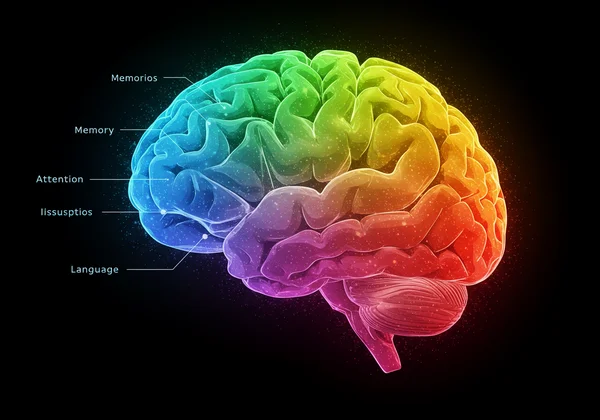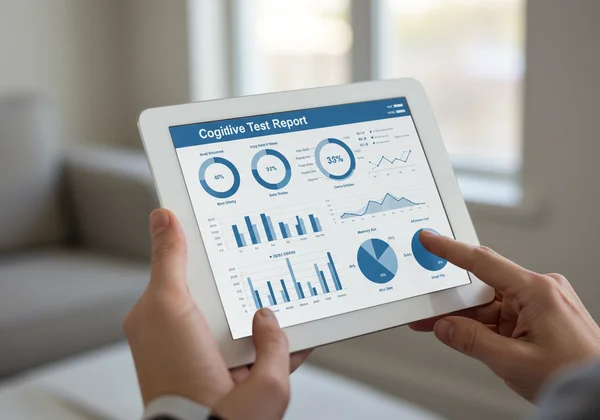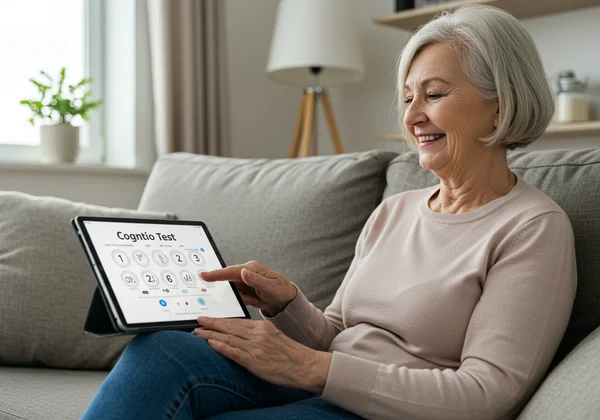Cognitive Test for Dementia: A Family & Caregiver Guide
August 26, 2025 | By Audrey Fletcher
When you notice subtle changes in a loved one's memory or thinking, it's natural to feel a mix of concern and uncertainty. Navigating the world of cognitive health can be overwhelming, filled with complex terms and daunting possibilities. This guide is here to offer clarity and support for families and caregivers. We will explore the role of a cognitive test for dementia, what these assessments involve, and how they can be a powerful tool for opening up conversations with healthcare professionals. What does a cognitive test consist of? It's more than just a memory quiz; it's a structured way to understand various brain functions.
Taking that initial step to gather information is a sign of profound care. An accessible online cognitive test can be a valuable first step, providing objective insights in a private, low-stress environment. This guide will walk you through what you need to know, empowering you to support your loved one on their cognitive health journey.
Understanding Cognitive Tests for Dementia Screening
The first hurdle for many families is simply understanding what a "cognitive test" is and why it matters, especially in the context of dementia screening. These tools are designed not to deliver a diagnosis but to provide a clear, objective snapshot of a person's cognitive functioning at a specific point in time. Think of it less as a final verdict and more as an essential piece of a larger health puzzle.
What Exactly Is a Cognitive Test?
At its core, a cognitive test is a standardized method for measuring mental abilities. It consists of various tasks and questions designed to evaluate different areas of cognition. These are not just about memory; a comprehensive test looks at a wide range of functions. Our brains are incredibly complex, and a good assessment reflects that by examining multiple skills.
A thorough cognitive assessment evaluates key domains such as:
-
Memory: Both short-term recall and long-term information retrieval.
-
Attention: The ability to focus on a task and filter out distractions.
-
Executive Functions: Skills like planning, problem-solving, and decision-making.
-
Language: The ability to understand and express oneself.
-
Visuospatial Skills: The capacity to perceive and interpret visual information.

The assessment on CognitiveTest.me is designed by neuropsychologists and data scientists to evaluate 22 core cognitive skills, providing a holistic and detailed view of an individual's mental strengths and challenges.
Why Are Cognitive Tests Important for Seniors?
For older adults, establishing a cognitive baseline is a crucial, proactive step in managing long-term health. Just as we monitor blood pressure or cholesterol, monitoring cognitive health allows for the early detection of potential issues. A cognitive test for seniors serves several vital purposes for families and individuals.
First, it provides objective data. Subjective feelings of "fogginess" or a family member's anecdotal observations are important, but a standardized test translates these concerns into measurable information. This data is invaluable for tracking changes over time. An initial test can serve as a baseline, and subsequent tests can show if skills are stable, improving, or declining, which is critical information for a physician. A quality online cognitive assessment makes this process simple and repeatable.
Recognizing Early Signs and When to Consider a Test
One of the most challenging aspects for any caregiver is determining when normal age-related forgetfulness might be something more. It's not always a single, dramatic event but often a slow progression of small changes. Knowing what to look for can help you decide when it might be time to consider an early signs of dementia test as a screening tool.
Common Early Signs of Cognitive Change to Observe
While every individual is different, researchers and organizations like the Alzheimer's Association have identified several common warning signs. Observing one or two of these occasionally may not be a cause for alarm, but a consistent pattern of several signs warrants attention.
Here are some key changes to be mindful of:
-
Memory Loss Disrupting Daily Life: Forgetting recently learned information, important dates, or asking the same questions repeatedly.
-
Challenges in Planning or Solving Problems: Trouble following a familiar recipe or managing monthly bills.
-
Difficulty Completing Familiar Tasks: Forgetting the rules of a favorite game or how to drive to a familiar location.
-
Confusion with Time or Place: Losing track of seasons, dates, or the passage of time.
-
New Problems with Words in Speaking or Writing: Struggling to follow or join a conversation or calling things by the wrong name.
-
Withdrawal from Social Activities: A noticeable decline in engagement with hobbies, friends, or family.

If these signs feel familiar, it doesn't automatically mean dementia. However, they are signals that a closer look at cognitive health could be beneficial.
Taking the First Step: How Our Platform Can Help
After observing potential signs, the question becomes, "What now?" An accessible, scientifically-grounded screening tool is a logical and empowering first step. This is precisely where our online assessment tool can help. Our platform was developed to bridge the gap between initial concern and a clinical visit, providing families with a reliable starting point.
Our online cognitive assessment is designed with the user in mind. It can be taken from the comfort of home, reducing the anxiety that can be associated with clinical settings. The test is comprehensive, going far beyond simple brain games to provide a nuanced profile of cognitive abilities. Because our assessment is built upon established scientific principles, like those found in the Woodcock-Johnson Tests of Cognitive Abilities (WJ-IV COG), the results provide a trustworthy foundation for understanding your loved one’s cognitive state. You can start your assessment whenever you are ready.
Interpreting Results & Communicating with Doctors
Receiving the results of a cognitive test can feel like a pivotal moment. It’s important to approach this stage with the right mindset: the report is a tool for understanding and a catalyst for conversation, not a diagnosis. Knowing how to interpret the information and use it effectively in a medical consultation is key to making the process productive.
Decoding Your Cognitive Test Score
Many people wonder, "what is a good cognitive test score?" The answer is that it's not about a simple "pass" or "fail." A meaningful cognitive assessment provides a profile, not just a single number. It will show areas of strength and areas where performance may be weaker. This detailed breakdown is far more useful than a single score because it helps pinpoint specific challenges.

The report from our assessment uses AI-enhanced analysis to translate complex data into a clear, easy-to-understand summary. It explains what performance in each cognitive domain means for daily life—for example, how attention skills impact the ability to multitask or how memory function affects daily routines. Most importantly, the report should be viewed as a snapshot in time. Stress, sleep, and mood can all influence performance. This is why it’s critical to share these results with a doctor. You can access your personalized report and review it before your appointment.
Preparing for a Productive Discussion with Healthcare Professionals
The primary value of a screening test is to facilitate a more informed and productive conversation with a doctor. Armed with the test report, you are no longer relying solely on vague concerns. You have concrete data to share, which helps healthcare professionals understand the situation more clearly.
To make the most of the appointment, consider these steps:
- Bring the Report: Print out the full cognitive report to share with the doctor.
- Provide Specific Examples: Supplement the report with real-world examples. For instance, "The report shows a challenge with planning, and I've noticed Mom has been struggling to organize her weekly pill box."
- List Your Questions: Write down all your questions beforehand so you don't forget anything during the appointment.
- Discuss Next Steps: Ask the doctor what the results might suggest and what the next steps for evaluation should be.
Using an online cognitive assessment as a starting point empowers you to become a more effective advocate for your loved one's health.
Empowering Your Family's Cognitive Health Journey
Facing concerns about a loved one's cognitive health requires courage, patience, and access to reliable information. Understanding the purpose of a cognitive test, recognizing early signs, and knowing how to use the results are empowering steps that transform uncertainty into action. Remember, a screening is a proactive tool for understanding, not a conclusion.
You are taking an important step by seeking knowledge and supporting your family. This journey is about ensuring your loved one receives the best care and support possible. Take the first step in understanding your family's cognitive health. Visit CognitiveTest.me to try our comprehensive, scientifically-backed assessment today.
Frequently Asked Questions About Cognitive Testing for Dementia
Can My Loved One Take a Cognitive Test Online for Free?
Yes, absolutely. Many platforms, including ours, offer a comprehensive and scientifically validated free cognitive test. This accessibility is crucial because it removes financial barriers, allowing anyone to gain valuable insights into their cognitive health from the comfort of their home. Our assessment provides a detailed report without any cost.

What If They Receive a Concerning Cognitive Test Score?
A concerning score is a prompt for conversation, not a reason for panic. It is a data point indicating that a follow-up with a healthcare professional is a good idea. The score itself is not a diagnosis. A doctor will use this information, along with a clinical interview, physical exam, and possibly other tests, to make a full evaluation. The result is a tool to help you start that important medical dialogue.
How Difficult Is an Online Cognitive Test?
Online cognitive tests are designed to be challenging enough to measure cognitive function accurately but intuitive enough for most people to complete without prior experience. The tasks will vary in difficulty. Some may feel easy, while others may require more concentration. The instructions are clear and simple, ensuring the focus remains on assessing cognitive skills, not on navigating a complicated interface.
Can I Administer a Cognitive Test to My Family Member at Home?
Yes, one of the primary advantages of an online tool is that it can be taken at home. To ensure the most accurate results, help your loved one set up in a quiet, comfortable space free from distractions. While you can be there for support and to help them get started, the tasks should be completed by them independently. The user-friendly design of the CognitiveTest.me platform makes this process smooth and straightforward for everyone involved.